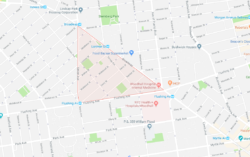
Broadway Triangle. Image credit: Google Maps.
Local residents and community activists brought an action to stop a rezoning that would encourage gentrification and racial disparity. Churches United for Fair Housing, along with local residents and other local groups, brought an action against the City in the Supreme Court of New York County to stop the construction of a housing development in the Broadway Triangle section of Brooklyn. Churches United is a local grassroots organization that seeks to preserve communities by advocating for non-exclusive and affordable housing. Churches United claimed that rezoning the area without evaluating segregation would result in discrimination against people of color, and violate the Fair Housing Act and Title VII of the Civil Rights Act.
The owners of the proposed development initiated a rezoning application in February 2015 to convert the former Pfizer sites, which are bounded by Union Avenue, Walton Avenue, Harrison Avenue and Gerry Street, southwest to the “Broadway Triangle,” which consists of Broadway, Flushing Avenue, and Union Avenue from manufacturing zone to a mixed residential and commercial zone. The revised application in May 2017 sought to develop eight mixed-use buildings that would contain 1,146 residential apartments and house approximately 4,072 people, along with approximately 63,000 square feet of commercial space.
In compliance with the Mandatory Inclusionary Housing provisions of the City’s zoning rules, 287 of the 1,146 residential apartments, or 25 percent, would be reserved as low-to-moderate-income units, which would be distributed through a lottery process handled by the Department of Housing Preservation and Development.
Brooklyn Community Board 1 voted 26-14 in favor of the proposed rezoning on June 13 2017. Three months later on September 19, 2017, the Department of City Planning approved the rezoning application and noted that the development would help address the “dire” need for more housing, including affordable housing in transit-accessible areas in Brooklyn.
On February 28, 2018, Churches United commenced a hybrid action-Article 78 proceeding, claiming the rezoning without evaluating segregation violates the Fair Housing Act, and deprives plaintiff’s right to equal access to affordable housing. The Supreme Court found that there were no facts to support any intentional discrimination or racial animus by either the developers, City officials, or in the entire rezoning process. Additionally, the court found that the developers could not be held liable for racial disparities that they did not create, and where there is no statistical evidence to show a causal connection between policies and a disparate impact.
The court further pointed out that the claim of disparate impact on racial minorities fails because the area was previously vacant and the proposed plan of building mixed-use, mixed-income housing creates housing from a previously unused space. The court continued by stating the claim that the development would be further segregating the Broadway Triangle neighborhood could not be supported because it would, in fact, bring “Whites closer to majority-minority areas.”
The court noted further that within the 50 years since the enactment of the Fair Housing Act, no court had required racial impact studies.
Churches United for Fair Hous., Inc. v. De Blasio, 2018 NY Slip Op 31826(U) (Sup. Ct. 2018).
By: Samantha Albanese (Samantha is the CityLaw intern and New York Law School Student, Class of 2019.)

